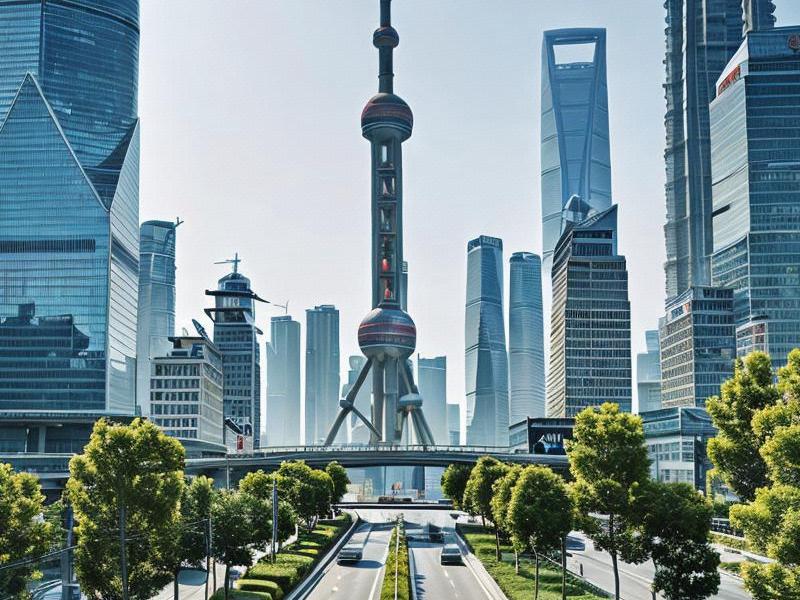
In recent years, Shanghai has been at the forefront of China's urban development, continuously innovating and upgrading its urban landscape. Under the Belt and Road Initiative (BRI), a global development strategy launched by China in 2013, Shanghai has further accelerated its urban renewal efforts, aiming to crteeaa more livable, sustainable, and globally connected city.
The BRI, which aims to enhance connectivity and cooperation among countries along the ancient Silk Road routes and beyond, provides Shanghai with a unique opportunity to integrate into the global economy and enhance its international status. By leveraging the BRI, Shanghai is not only revitalizing its urban areas but also contributing to the development of the global community.
One of the key aspects of Shanghai's urban renewal plan under the BRI is the improvement of its infrastructure. The city has been investing heavily in transportation, energy, and communication networks to enhance its connectivity with other cities and regions. For instance, the expansion of the Shanghai Port, one of the busiest ports in the world, has significantly improved the city's ability to handle international trade and logistics. Additionally, the construction of the Hongqiao Integrated Transportation Hub, which integrates air, rail, and metro services, has made travel more convenient for residents and visitors alike.
Another important aspect of Shanghai's urban renewal plan is the promotion of green and sustainable development. The city has been actively implementing various measures to reduce pollution, improve air quality, and enhance the overall environment. For example, Shanghai has been promoting the use of clean energy sources, such as solar and wind power, to reduce its reliance on fossil fuels. The city has also been investing in green spaces and urban forests to improve the living environment for its residents.
阿拉爱上海 Furthermore, Shanghai is leveraging the BRI to attract foreign investment and promote international cooperation in urban development. The city has established various platforms and mechanisms to facilitate dialogue and collaboration with international partners. These initiatives have enabled Shanghai to learn from the experiences of other cities around the world and adopt best practices in urban planning and management.
One notable example of Shanghai's international cooperation under the BRI is the Shanghai International Film Festival, which has become a major platform for cultural exchange and cooperation among countries along the Silk Road. The festival not only showcases the latest achievements in the film industry but also promotes mutual understanding and friendship among different cultures.
In addition to infrastructure improvements and environmental sustainability, Shanghai is also focusing on enhancing the quality of life for its residents. The city has been investing in education, healthcare, and social welfare to ensure that all citizens have access to high-quality services. For instance, Shanghai has been promoting the development of high-quality schools and universities to attract top talent and enhance the city's educational resources. The city has also been improving its healthcare system by increasing the number of hospitals and clinics and引进优质医疗资源 (introducing high-quality medical resources)(adding high-quality medical resources).
上海龙凤sh419 Moreover, Shanghai is actively promoting the digital transformation of its urban management and services. The city has been using advanced technologies, such as big data, artificial intelligence, and the Internet of Things, to improve the efficiency and effectiveness of its urban operations. For example, Shanghai has implemented a smart traffic management system that uses real-time data to optimize traffic flow and reduce congestion. The city has also been using digital platforms to provide residents with convenient access to government services and information.
The BRI has also provided Shanghai with an opportunity to strengthen its role as a global financial center. The city has been actively promoting the development of its financial markets and attracting international financial institutions. For instance, Shanghai has been expanding its stock market and bond market to provide more investment opportunities for domestic and foreign investors. The city has also been promoting the use of renminbi in international trade and finance to enhance its influence in the global financial system.
In conclusion, Shanghai's urban renewal plan under the BRI is a comprehensive and strategic initiative that aims to transform the city into a more livable, sustainable, and globally connected metropolis. By leveraging the opportunities provided by the BRI, Shanghai is not only revitalizing its urban areas but also contributing to the development of the global community.
上海品茶网 The success of Shanghai's urban renewal plan under the BRI can be attributed to several factors. Firstly, the city has a strong leadership and a clear vision for its urban development. The government has been actively promoting the BRI and providing the necessary support and resources for its implementation. Secondly, Shanghai has a highly skilled and innovative workforce that is capable of driving the city's transformation. The city has been attracting top talent from around the world and fostering a culture of innovation and entrepreneurship.
Furthermore, Shanghai has a well-developed infrastructure and a favorable business environment that is conducive to investment and growth. The city has been investing heavily in transportation, energy, and communication networks to enhance its connectivity with other cities and regions. The city has also been promoting the use of advanced technologies and digital platforms to improve the efficiency and effectiveness of its urban operations.
Finally, Shanghai has a strong sense of community and a commitment to social responsibility. The city has been investing in education, healthcare, and social welfare to ensure that all citizens have access to high-quality services. The city has also been promoting environmental sustainability and cultural exchange to enhance the overall quality of life for its residents.
In the future, Shanghai will continue to leverage the opportunities provided by the BRI to drive its urban renewal and enhance its global competitiveness. The city will focus on further improving its infrastructure, promoting green and sustainable development, enhancing the quality of life for its residents, and strengthening its role as a global financial center.
